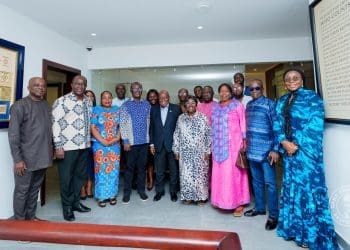Tano North Member of Parliament, Dr Gideon Boako, has called on Ghanaian students to actively participate in shaping the nation’s sustainability agenda through research, innovation, and advocacy, stressing that the youth are pivotal to building an economy that balances progress with environmental and social responsibility.
Dr Boako made the remarks during a panel discussion at the 2025 International Sustainability Conference, hosted by the Kwame Nkrumah University of Science and Technology (KNUST) College of Humanities and Social Sciences.
The conference brought together academics, policymakers, and industry leaders to explore the role of business innovation in achieving sustainable development.
“As students, you are not just the future workforce; you are the future innovators, policymakers, and sustainability champions,” Dr Boako told participants.
He encouraged students to form sustainability clubs, research groups, policy think tanks, and innovation hubs aimed at addressing pressing development challenges such as waste management, climate resilience, and social equity.
He also urged universities to create platforms that allow young researchers and entrepreneurs to test, pilot, and scale green solutions, describing student-led initiatives as potential incubators of real change.
“Through collaboration, creativity, and commitment, student groups can become incubators of real change,” he noted.
Dr Boako emphasised that sustainability efforts must go beyond environmental conservation to include fair labour practices, inclusive governance, and equitable access to resources.
“Our generation must be the one that proves that development and sustainability can go hand in hand — for Ghana, for Africa, and for the world,” he said.
Call for a green industrial policy framework
In addition to engaging students, Dr Boako urged the government to develop a comprehensive Green Industrial Policy Framework to guide Ghana’s industrial transformation in alignment with sustainability objectives.
Speaking during a panel session at the KNUST Graduate School of Business, he explained that a coordinated framework is essential to align sectoral policies, investments, and regulatory initiatives around sustainable industrialisation.
The MP, who also serves as an Economics and Finance lecturer at the KNUST School of Business (currently on leave to serve in Parliament), acknowledged the government’s earlier steps toward green growth, including the launch of the Ghana Green Finance Taxonomy in 2024, but noted that a fully harmonised policy direction remains absent.
He highlighted several challenges undermining sustainable industrialisation in Ghana, including high electricity costs, limited access to affordable financing, insufficient technical skills, and a low culture of sustainability among businesses.
“Many enterprises still view sustainability as an extra cost rather than an opportunity for innovation and long-term savings,” he said.
Dr Boako also pointed to emerging opportunities in agro-industrial sustainability, digital transformation, and renewable energy.
He emphasised that Ghana could anchor green growth in agriculture, waste recycling, and smart manufacturing, leveraging innovation to drive economic and environmental benefits simultaneously.
The MP called for stronger public–private partnerships and increased investment in innovation-driven enterprises, arguing that aligning industrial policy with sustainability could enable Ghana to achieve inclusive, resilient, and environmentally responsible growth, setting an example for Africa.
“The future of Ghana’s economy will depend on how well the nation integrates environmental responsibility into industrial and business practices,” Dr Boako concluded, emphasising the critical role of both students and policymakers in shaping a sustainable and prosperous nation.
This call comes at a time when Ghana, like many African countries, is grappling with balancing rapid industrial growth with environmental protection and equitable social development, making the engagement of youth, academia, and the private sector essential for long-term sustainable progress.











